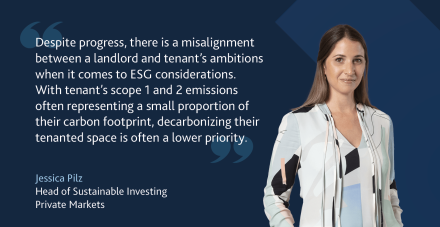
March 21, 2024
Jessica Pilz, Head of Sustainable Investing Private Markets, recently discussed whether ESG is on the radar for tenants on Avison Young’s panel at MIPIM.
Office owners prioritising the environmental credentials of their buildings are doing so for many reasons – but surprisingly few of them are to do with the tenants.
This was the message from speakers on a panel debate about office occupiers’ “want lists”, held at MIPIM and hosted by Avison Young.
Speaking on the panel, Ali Abbas, UK managing partner at Art-Invest Real Estate, said he wanted to redefine ESG as “Everybody wants the Same Goals”.
“In terms of trying to triangulate what investors, occupiers and the community wants, I think it has got a bit easier because we are all on this journey of trying to do better and more,” said Abbas, whose company is developing three office blocks in London’s Canada Water
But fellow panellists questioned whether all office occupiers are equal when it comes to their focus on the ESG credentials of their buildings.
Chanté Bohitige, EG’s London and offices reporter, described the issue as “the $1m question” for real estate owners, and one to which the answer depends on the tenant.
“If you’re looking at a big corporate occupier, one way in which they can put a stake in the ground and show commitment to their ESG goals is through their real estate,” Bohitige said.
“And it’s a fairly effective way to do it, considering their real estate is relatively low-cost in comparison to most of the other company costs that they have.”
Smaller companies, however, are often less focused on the issue.
“I think there are a lot of smaller occupiers, who are taking 5,000 sq ft, 10,000 sq ft, that aren’t necessarily as concerned with ESG, in the sense that it’s maybe not a priority for them,” Bohitige added.
“I think they would be happy to have it if they could get it. But there are other priorities that come first – namely location. That usually trumps ESG.”
Elliot Prosser, an executive director at JP Morgan Asset Management, agreed, based on the firm’s own experiences on its 45 Pall Mall scheme, which recently reached practical completion and has achieved what was until recently a record rent for the street.
“I would say with smaller tenants, smaller floor plates – around 8,000 sq ft – ESG is just not really on the radar,” Prosser said.
“It’s a priority for the investors, it’s a priority for the capital markets, and it’s absolutely paramount for anything that you’re looking to sell into the market today. But it’s just not there for the for the underlying occupiers, especially those smaller guys.
“And even when we get up to the bigger buildings, again, it’s very low down on the list.
“Investors are putting an awful lot of money into buildings so that they can sell them, not so they can lease them.”
Fiera Capital head of sustainable investing Jessica Pilz said that for many companies, the environmental impact of their office pales in comparison to other aspects of their business, which makes it harder to justify focusing on.
“There’s this common misconception that it is the building they work in that should be really important to them, but sometimes it only accounts for such a small proportion [of emissions],” Pilz said.
“Their supply chains, those scope three emissions, account for so much more. The scope one and two emissions, direct emissions, the gas and electricity from operating your office, accounts for such a tiny proportion of what they do.
“So it is really hard to align our ambitions with our tenants.”